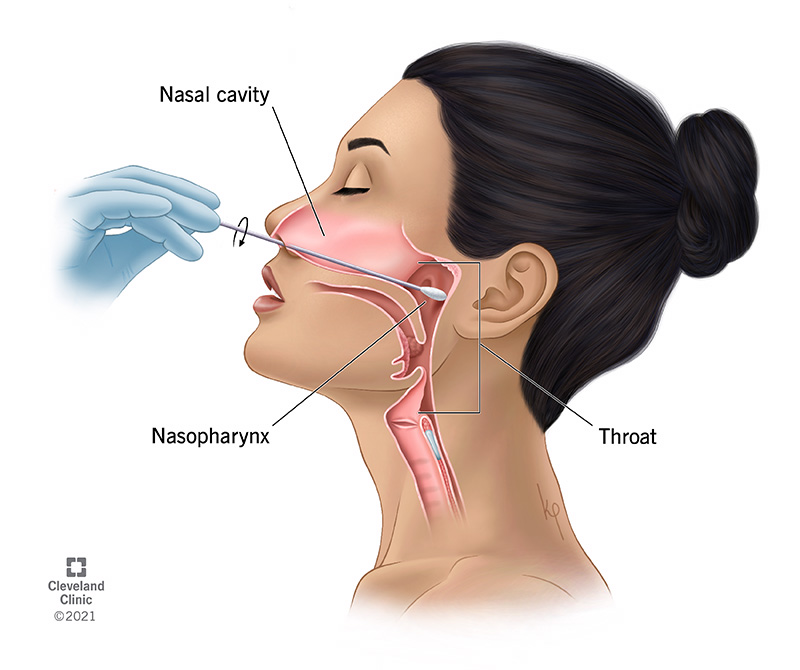If your healthcare provider thinks you have a respiratory infection, they may want to do a nasopharyngeal swab test. This takes a sample from far back in your nasal cavity to analyze for bacteria or viruses like SARS-CoV-2, the virus that causes COVID-19. This test is accurate when it’s done right and should only be done by a trained medical professional.
Advertisement
Cleveland Clinic is a non-profit academic medical center. Advertising on our site helps support our mission. We do not endorse non-Cleveland Clinic products or services. Policy

Image content: This image is available to view online.
View image online (https://my.clevelandclinic.org/-/scassets/images/org/health/articles/22878-nasopharyngeal-swab)
A nasopharyngeal swab, one type of nasal swab, is a test used to look for bacteria or viruses that cause respiratory infections. Your healthcare provider uses a swab to take a small sample of cells from your nasopharynx, the top part of your nose and throat. The long, thin part of the swab is made of flexible plastic or wire. There’s a tip on the end of the swab that absorbs a sample of fluid from your nasopharynx.
Advertisement
Cleveland Clinic is a non-profit academic medical center. Advertising on our site helps support our mission. We do not endorse non-Cleveland Clinic products or services. Policy
Your provider will do the test. Unlike some other nasal swab tests that don’t need to go very far into your nose, this is not one you can do yourself. Problems can happen if it’s not done correctly.
Your healthcare provider may do this test if they think you have a respiratory infection such as:
If you have respiratory infection symptoms, your provider may suspect you have an infection. Respiratory infection symptoms include:
Advertisement
Usually, you don’t need to do anything to get ready for the test. If you are getting a COVID-19 test, you may be asked to blow your nose into a facial tissue right before the test.
Since the swab will be going from your nostril to just about where your ear is, it can be uncomfortable. It may make you gag or cough briefly.
Your sample will be placed in a container, which will be sealed. It'll be sent to a lab, where it will be studied. Your provider can tell you the results from the lab.
In some cases, people can get a nosebleed after the test. Rarely, a provider has to remove a broken swab from a person’s nose. Only a trained provider who understands the anatomy of your nasal cavity does the test to minimize the risk of complications. The test results could also be inaccurate if the test isn’t done the right way.
You may find out your lab test results fairly quickly if the lab is near where you live. But if your sample has to be sent to another city, it could take longer. It also depends on how many tests the lab is processing at that time.
When you get your test done, they should give you an estimate of when your results will be ready. If you don’t hear from your provider by that time, follow up with them.
Although no one likes getting a nasopharyngeal swab test, the discomfort is temporary. The information the sample will give your provider will help them figure out what’s making you sick. Once you know what’s wrong, you’re one step closer to feeling better. When your provider knows what the problem is, they can give advice to get you back to better health.
Advertisement

Sign up for our Health Essentials emails for expert guidance on nutrition, fitness, sleep, skin care and more.
Learn more about the Health Library and our editorial process.
Cleveland Clinic’s health articles are based on evidence-backed information and review by medical professionals to ensure accuracy, reliability and up-to-date clinical standards.
Cleveland Clinic’s health articles are based on evidence-backed information and review by medical professionals to ensure accuracy, reliability and up-to-date clinical standards.
Cleveland Clinic’s primary care providers offer lifelong medical care. From sinus infections and high blood pressure to preventive screening, we’re here for you.
